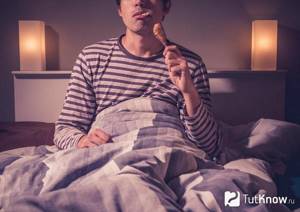Many people cannot fall asleep unless they eat first.
Without realizing it, they have created a habit that is difficult to consider useful. For many, eating before bed has become as much a tradition as breakfast. As a result, you shouldn’t be surprised at the appearance of extra pounds. Today, the habit of eating late at night is widespread. We will try to answer why we want to eat at night and how to avoid it. There is no point in separating the concepts of “eating at night” and “eating at night.” This is due to the fact that these habits are based on the same characteristics of the human body and psychological motives. Note that when talking about “eating at night,” we mean a hearty meal after seven o’clock in the evening. If you consume a small amount of, say, cottage cheese, two hours before going to bed, then there is nothing wrong with that. For example, all professional bodybuilders do this to slow down the nighttime catabolic processes.
Is it possible to eat food at night?
Before we tell you why we want to eat at night, we should find out the positive and negative consequences of this act. You must remember that the body's functioning at night is significantly different from during the day. Now we will consider only part of the processes that are directly related to our topic:
- In the evening, there is a gradual decrease in the activity of the digestive system - as a result, almost the entire late meal remains in the stomach and is practically not processed. This leads to the formation of a large amount of toxins, as decay processes are activated. In the morning, the food processing process resumes and all harmful substances end up in the bloodstream. It is quite obvious that such “fuel” is not the best for the upcoming working day. In addition, you must remember that heavy foods and foods with various chemical additives require a lot of time to process.
- A full stomach at night puts pressure on other internal organs - this leads to a slowdown in the delivery of oxygen and nutrients and negatively affects the quality of sleep.
- During sleep, a person practically does not move - all carbohydrates that enter the body in the evening will be converted into fat. Scientists are confident that eating a heavy meal at night contributes to the development of obesity no less than a sedentary lifestyle.
- The synthesis of hormonal substances slows down - a decrease in the rate of melatonin production negatively affects the quality of sleep, and an imbalance between catabolic and anabolic hormones contributes to the activation of the aging process.
If you want to learn more interesting facts about the effects of nighttime snacking on the body, then you can find a large number of materials based on scientific research on the Internet.
Why do people want to eat at night - the main reasons

It should be said right away that there is no consensus in scientific circles on this matter. If we call on logic to help, we can draw the following conclusion: not eating enough during the day, a person wants to eat at night. This explanation seems to us to be the most accurate. Another explanation for this phenomenon is often the high level of body fatigue accumulated during the day. But it should be remembered that night trips to the refrigerator are directly related to psychology. Often people eat food at night because of emotional problems, for example, the day was not the best or a severe stressful situation arose. As a result, the brain needs some kind of compensation for the lack of positive emotions.
We are all very familiar with one of the most popular ways to deal with stress - eating. At the same time, each person understands that this is harmful, but continues to follow the established habit. If you eat food often at night, then at some point the habit will become a disease, which psychologists call night overeating syndrome.
This disease is dangerous not only because it leads to excess weight gain, but also disrupts the functioning of the entire body. First of all, we are talking about hormonal imbalance, which in turn can cause the development of more serious ailments. Studies have found that a person who wakes up at night to eat food decreases the concentration of melatonin and thereby disrupts sleep patterns.
Scientists also discovered a disruption in the synthesis of hormonal substances such as leptin and cortisol. Let us remind you that they are responsible for suppressing hunger and stress. At the same time, many experts are confident that the habit of eating at night is directly related to hormonal imbalance, and this can be caused by poor nutrition. As you can see, scientists cannot yet give an intelligible answer to the question why we want to eat at night?
Possible reasons
The reasons why you really want to eat at night vary significantly among individual patients. However, there are conditions and diseases that are most often accompanied by such sensations.
- The simplest reason is poor nutrition during the previous day. If a person was unable to have a good breakfast, lunch or dinner, then his body may want this during the night, which is perceived by many people as a symptom of the disease. A similar situation occurs in pregnant women, since during pregnancy the need for nutrients is constantly at a high level.
- The second most common reason why you want to eat at night is chronic or acute stressful situations that can occur both in a person’s personal and professional life.
- Psychology has a certain significance, since some people have a fear of the dark, and they try to drown it out with the help of sweets or other palatable foods.
- It is important to understand that the reason why you crave sweets at night may be associated with organic diseases of the digestive system, for example, gastritis. In this regard, it is necessary to consult a doctor if such symptoms appear.
If a person wants to eat at night, then you should not immediately panic about the presence of serious diseases. In most cases, the causes of this condition are related to poor nutrition or stress in life.
Psychological stress is one of the main factors that increase appetite in people during a night's rest.
Is it possible to determine the presence of night eating syndrome on your own?

Now we list the main symptoms of this phenomenon:
- Frequent desire to snack late in the evening or at night.
- You can’t fall asleep for a long time, and in the middle of the night you wake up hungry.
- In the morning you have no appetite and feel discomfort when eating food.
- The bulk of calories are consumed in the evening.
- There is often anxiety and guilt when eating at night.
- You experience frequent stress, a bad mood, and there are also outbursts of aggression and nervousness.
The risks of acquiring night eating syndrome increase significantly if you are overweight or have bad habits.
If within 30 days you observe the first and second symptoms in combination with any of the remaining ones, we recommend visiting an endocrinologist and gastroenterologist. Unfortunately, today there is no effective therapy for the treatment of night eating syndrome. However, experts can help you keep your appetite and sleep under control through some lifestyle changes. Note that among the reasons for the desire to eat food at night there may also be problems with the functioning of the digestive system, for example, gastritis. Agree, this is another compelling reason to visit a doctor and understand the situation. Often this illness is hidden, and a person may not even be aware of its presence.
If you wake up hungry
“As a rule, this happens if the blood sugar level drops to a very low level, about 2 mmol/l,” says Elena Tikhomirova. — In a healthy person, this condition can occur after a high-intensity, excessive workout the night before. Or due to a low-carbohydrate diet (less than 80 g of carbohydrates per day), which he adheres to for several days. In both cases, glycogen reserves in the liver and muscles are depleted—the “reserve fund” that helps the body maintain blood glucose levels at an acceptable level.”
What to do?
* Give up restrictive diets and balance your diet with proteins, fats and carbohydrates. Low-carb fasting days are possible, but just as days, as a one-time event - a shake-up that helps avoid a dietary plateau.
* Exercise in moderation. Unless you're a professional athlete, 60 minutes of moderate cardio is plenty. After one group lesson at the fitness club, you don’t need to stay for a second one.
* On training days, try not to go without dinner. Do you study in the evening and come home around ten? About an hour and a half before physical activity, have a hearty afternoon snack (details here).
[new-page]
What can you eat in the evening?

This suggests that some products are still allowed during this period of time. In practice, this is how it works, and certain products will not only be safe, but even healthy. Let's look at this issue too. For many people, the entire teaching about proper nutrition in the evening and at night fits into one postulate - you should not eat food after six or seven hours. But you must remember that proper nutrition presupposes the absence of hunger, which in this case is almost impossible. If you force yourself to stop eating food, then at some point you will break down and only make the situation worse. It should also be remembered that fasting has a negative impact on the functioning of the entire body. So what can you eat in the evening?
Light protein products
Meat is also a source of proteins, but it is a heavy product and should not be consumed in the evening. If you cannot do without it, then give preference to low-fat varieties and eat the product in small quantities. But you can safely afford low-fat yogurt and kefir. Fish or a couple of slices of boiled chicken may also be a good choice.
Eat minimal carbohydrates in the afternoon
Surely you know that it is excess carbohydrates that are converted by the body into fat. We have already said that in the evening the digestive system begins to work in a gentle mode and it is undesirable to consume carbohydrates at this time. However, we remember that this nutrient can be different, and you won’t be satisfied with protein compounds alone. An excellent example of a healthy evening meal would be a vegetable salad with a piece of cheese, as well as a glass of low-fat kefir or yogurt.
The last meal should take place at least two hours before bedtime
The only exception to this rule may be a glass of low-fat kefir. This product does not contain carbohydrates and has a positive effect on the digestive system.
The famous American psychologist Albert Stankard devoted a lot of time to researching the problems of nighttime overeating syndrome. As a result, he is confident that the main reason for its development is improperly organized nutrition throughout the day. For people suffering from this disease, he created a special dietary nutrition program. It does not contain any serious innovations and generally complies with generally accepted standards of proper nutrition.
Why does appetite increase in the evening: how to overcome gluttony?
- Physiological reasons for increased appetite in the evening
- Pathological causes
- What to do?
An increase in appetite can be a completely normal phenomenon due to long-term food intake. This is a requirement of the body. A signal about the need to eat something and replenish the lack of energy.
An unmotivated feeling of hunger is often encountered, even if very little time has passed since the last meal. There are many options for why this happens: from the characteristics of a particular person’s biorhythms to pathological processes in the nervous system, endocrine system, digestive tract, and mental disorders.
How to fight the habit of eating at night?

We have already said that there is no effective therapy for the treatment of night eating syndrome. The only way to fight it so far is to change your lifestyle. Here are the basic steps that all people who frequently eat at night should take.
- Eat right throughout the day.
Don't skip breakfast. According to the results of one study, women who ate more food during their first meal compared to dinner were able to lose excess weight faster. If you consume enough calories in the morning and at lunch, then in the evening you will not be tormented by a strong feeling of hunger. - Try to eat only healthy foods.
Some people may find it difficult to change their eating habits quickly. We recommend giving up harmful foods gradually. - Do not eat foods that stimulate serotonin synthesis.
This applies to baked goods and sweets. However, it is not necessary to completely abandon these dishes. It is enough to replace harmful products with healthy analogues. For example, instead of chocolates, eat a marshmallow or a piece of dark chocolate. - Strengthen your strong-willed qualities.
It has already been said above that people often eat food and do not feel hungry. You need to learn to distinguish between real hunger and psychological hunger. This will get rid of a lot of problems. If you can’t do this yourself, then seek help from a specialist. - If you can't give up late-night snacks, make them healthy.
You already know what foods you can safely eat in the evening. If you want to eat at night, take an apple or drink a glass of freshly squeezed juice. But you should avoid store-bought ones.
For more information about why you want to eat at night, watch the video:










